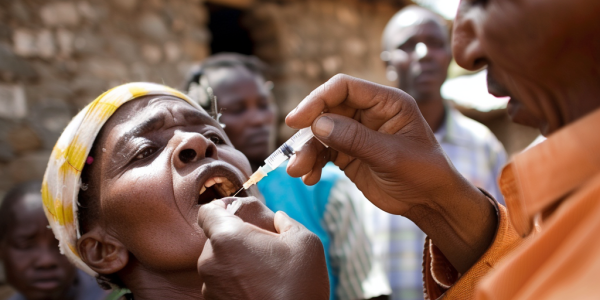WHO Approves New Oral Cholera Vaccine to Combat Global Outbreaks
Zambia battles a cholera outbreak with the approval of a new oral cholera vaccine, Euvichol-S, by the WHO. The increased production of the vaccine aims to address the global cholera crisis, with an expected rise in supply for 2024. Gavi and UNICEF are actively involved in response efforts, emphasizing preventive measures and control strategies to combat the escalating outbreaks.
Radiologists’ Role in Smoking Cessation Efforts
Recent studies have shown that radiologists can significantly impact patients’ willingness to quit smoking by providing onsite smoking cessation support during CT lung cancer screening appointments. Research revealed that a brief consultation with a radiologist resulted in nearly 90% of patients feeling more motivated to quit smoking. Tailored smoking cessation programs are crucial to address the needs of different patient groups, with potential for integration into national lung cancer screening programs to reduce smoking-related morbidity and mortality globally.
Study Finds Link Between Recreational Cannabis Use and Reduced Risk of Cognitive Decline
A recent study published in the journal Current Alzheimer Research reveals a surprising link between recreational cannabis use and a 96% reduced risk of cognitive decline. Researchers examined various forms of cannabis consumption and frequency of use, marking a novel approach in the field of cannabis research. While the study suggests a potential protective effect of cannabis on cognition, it does not definitively establish a causal relationship. The focus on subjective assessments of cognitive decline sets this study apart, addressing common confounding factors in diagnosing cognitive disorders.
Elderly man in Amsterdam infected with Covid-19 for 613 days succumbs to virus
An elderly man from Amsterdam, immunocompromised due to previous stem cell transplants, spent a record-breaking 613 days infected with Covid-19, leading to around 50 virus mutations. Despite receiving multiple vaccinations, his immune system failed to produce measurable antibody responses, allowing the virus to evolve and evade immunity. This case highlights the risks of prolonged infections in vulnerable individuals and the importance of tailored approaches to managing such cases.
Yale Researchers Uncover Genetic Landscape of Neuroendocrine Tumors of the Cervix
Researchers from Yale School of Medicine have made significant strides in understanding the genetic landscape of neuroendocrine tumors of the cervix (NETc) to potentially improve treatments for this rare and aggressive disease. The study, published in the Proceedings of the National Academy of Sciences, unveiled novel genes and pathways that could pave the way for precision medicine approaches in treating NETc patients. Dr. Alessandro Santin emphasized the importance of genetic data in guiding the development of innovative therapies, suggesting a combination of common chemotherapy regimens with immunotherapies for a more effective treatment strategy.
Hyundai Bioscience to Conduct Global Clinical Trials for Dengue Antiviral Candidate
Hyundai Bioscience, a biotechnology company from South Korea, is focusing on global clinical development for a Dengue antiviral candidate to secure emergency use authorization. The CEO plans to conduct clinical tests targeting all Dengue virus serotypes, aiming for early administration of an effective antiviral drug. With a rise in Dengue cases globally, especially in the Americas, the need for a specific treatment is crucial. Hyundai Bioscience’s initiative in conducting extensive clinical trials signifies a significant step towards addressing the urgent need for a Dengue antiviral solution.
New Mexico Confirms Third Case of Highly Pathogenic Avian Influenza in Poultry
New Mexico confirms its third case of highly pathogenic avian influenza in poultry, with a commercial hatchery in Roosevelt County reporting 51,800 affected birds. USDA APHIS is monitoring the situation, emphasizing the need for biosecurity measures to prevent further spread. Stay informed with WATTPoultry.com’s interactive map on avian influenza outbreaks.
Obesity’s Impact on Breast Cancer Revealed in New Study
Recent research has revealed unique gene alterations in breast cancer patients with high body mass indexes, shedding light on the link between obesity and the disease. Led by Ha-Linh Nguyen, scientists analyzed genetic profiles of breast tumors in obese patients to uncover potential treatment strategies. The study included data from over 2,000 breast cancer patients, categorizing individuals based on body mass index and differentiating between types of breast tumors and estrogen receptor status. By examining these factors, the researchers aimed to provide insights for more targeted and effective treatment approaches in the future.
Rising Use of Skin Fairness Creams in India Linked to Kidney Problems, Study Finds
The use of skin fairness creams in India is driving a surge in kidney problems due to high mercury content. A recent study published in Kidney International found that these creams are contributing to cases of Membranous Nephropathy, damaging kidney filters and causing protein leakage. Dr. Sajeesh Sivadas from Aster MIMS Hospital in Kerala warns about the severe consequences of using these creams, emphasizing the need for public awareness to protect individuals’ health in India.
Chinese Scientists Discover Gut Bacteria in Mosquitoes to Combat Dengue and Zika
Chinese scientists have discovered a gut bacteria in mosquitoes that could prevent the transmission of dengue and Zika viruses to humans. Published in Science, the research proposes introducing this bacterium into mosquito populations as a natural strategy to combat these diseases. With millions infected by dengue annually, the study highlights the potential of a nature-based approach to address global health threats posed by mosquito-borne viruses.










